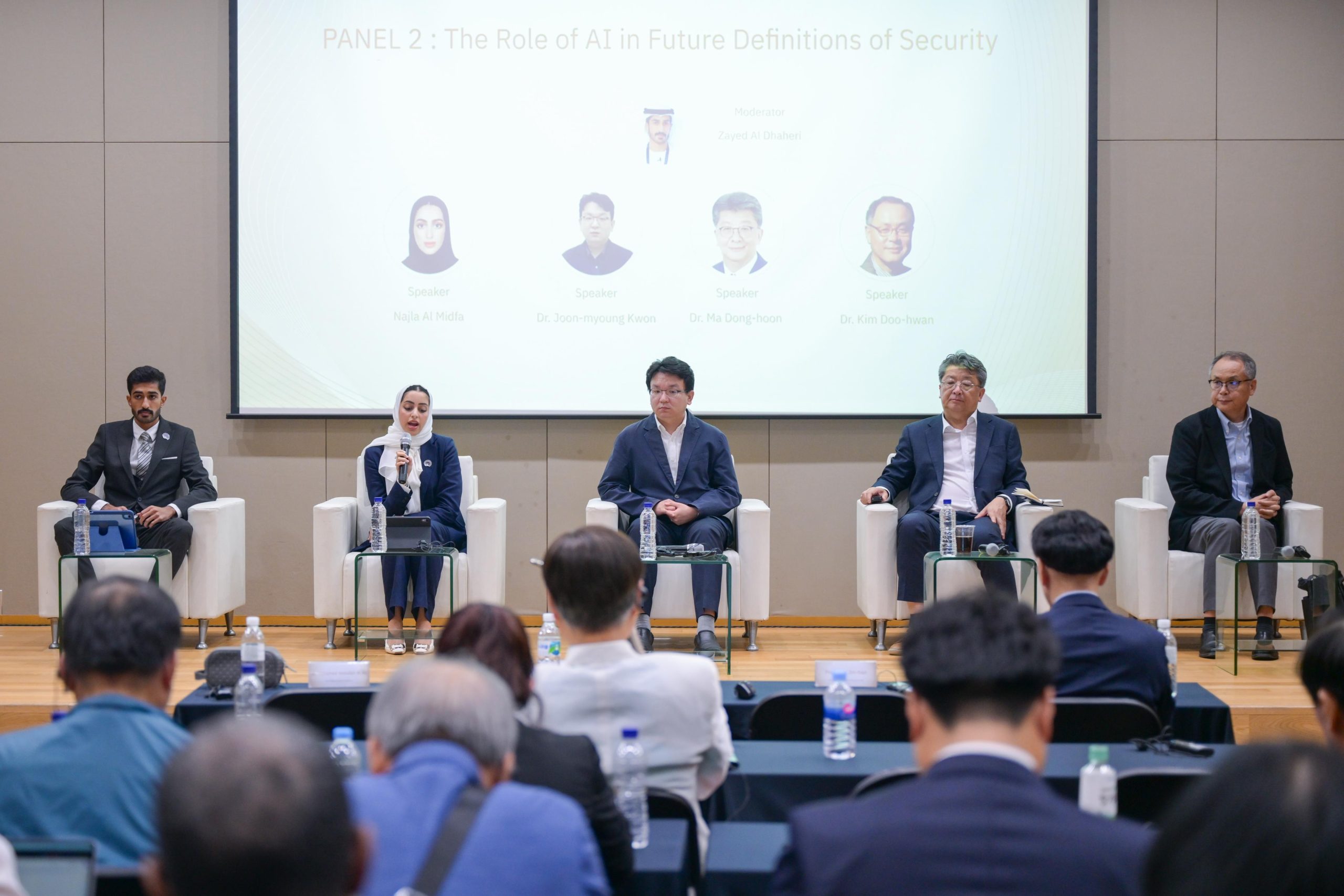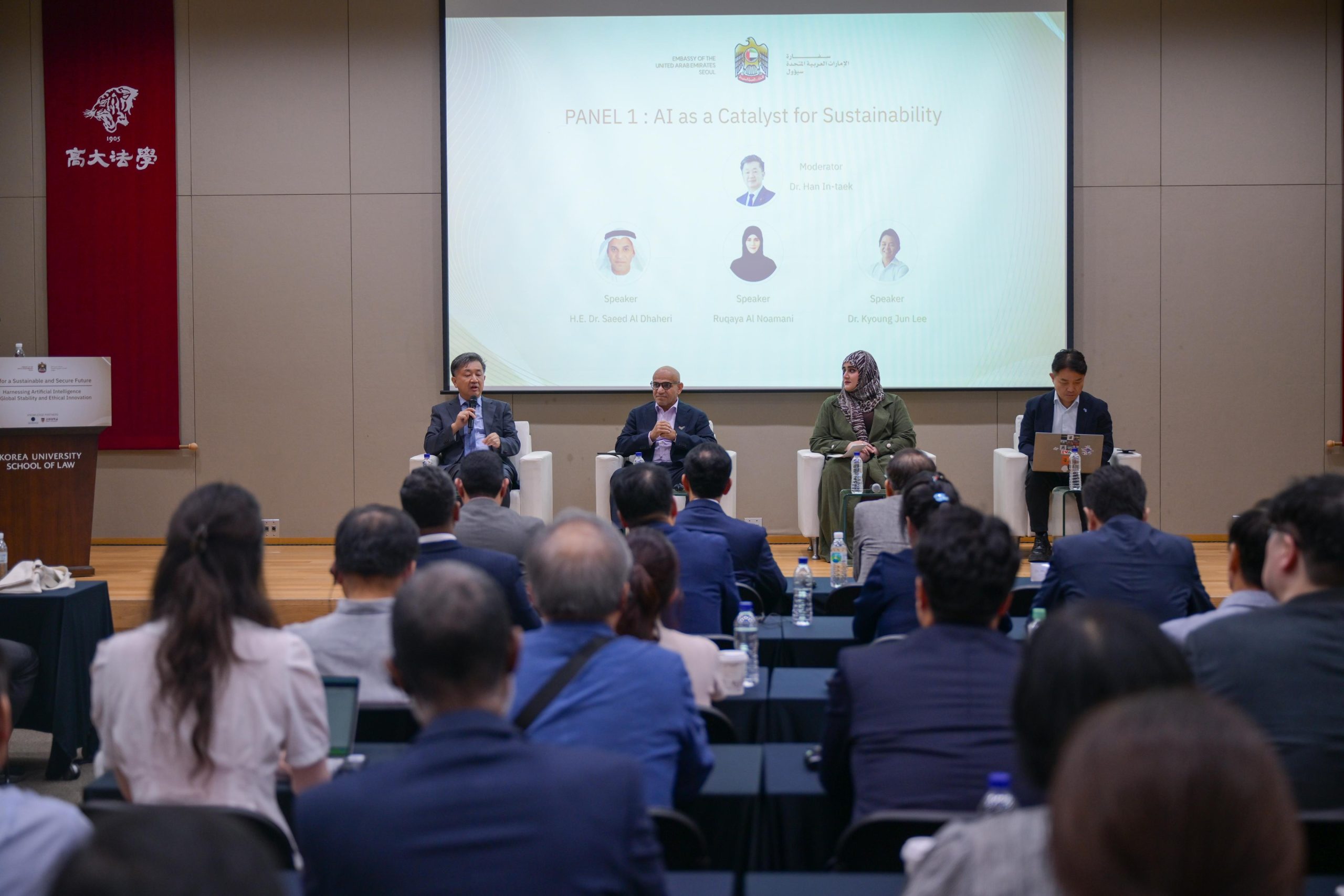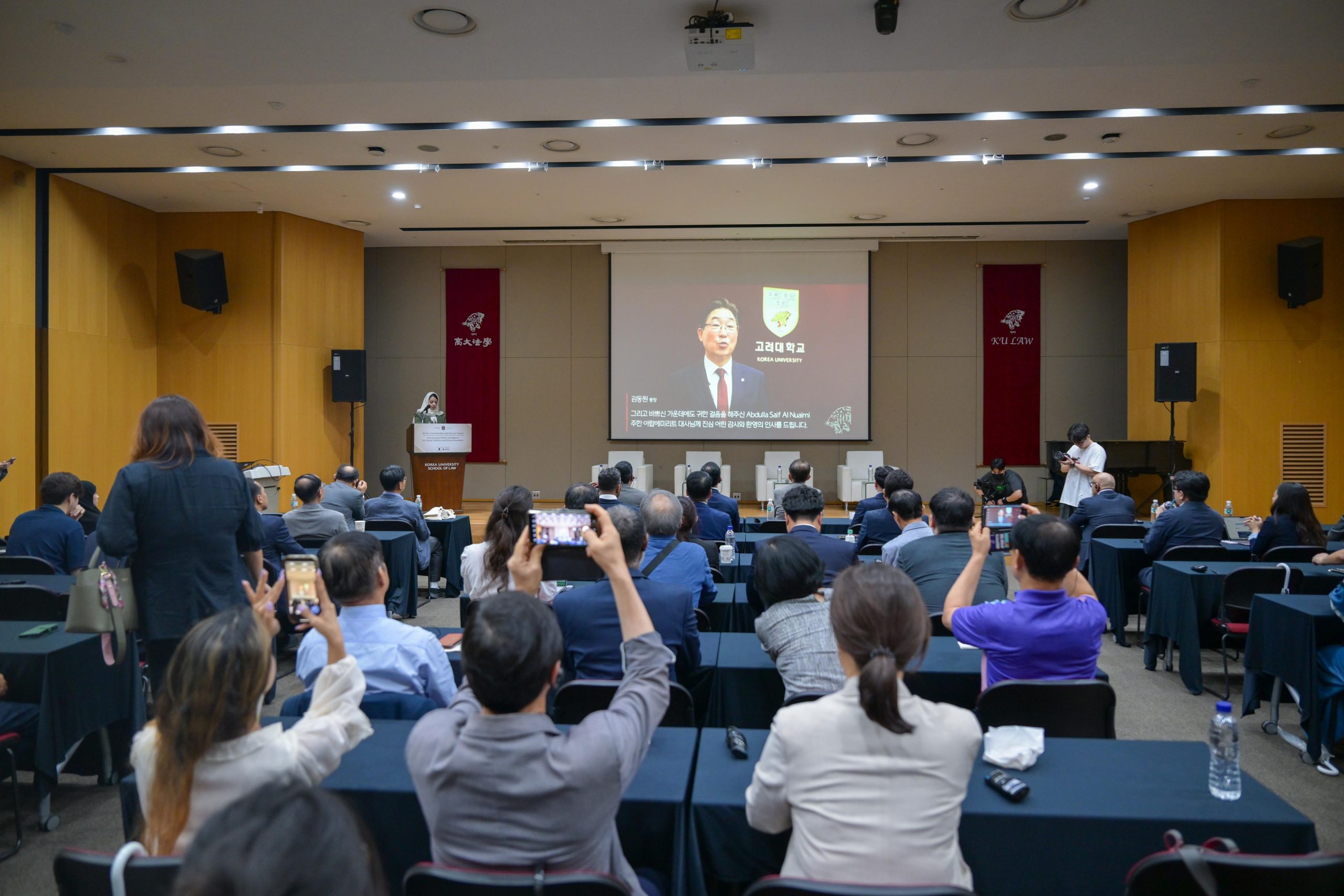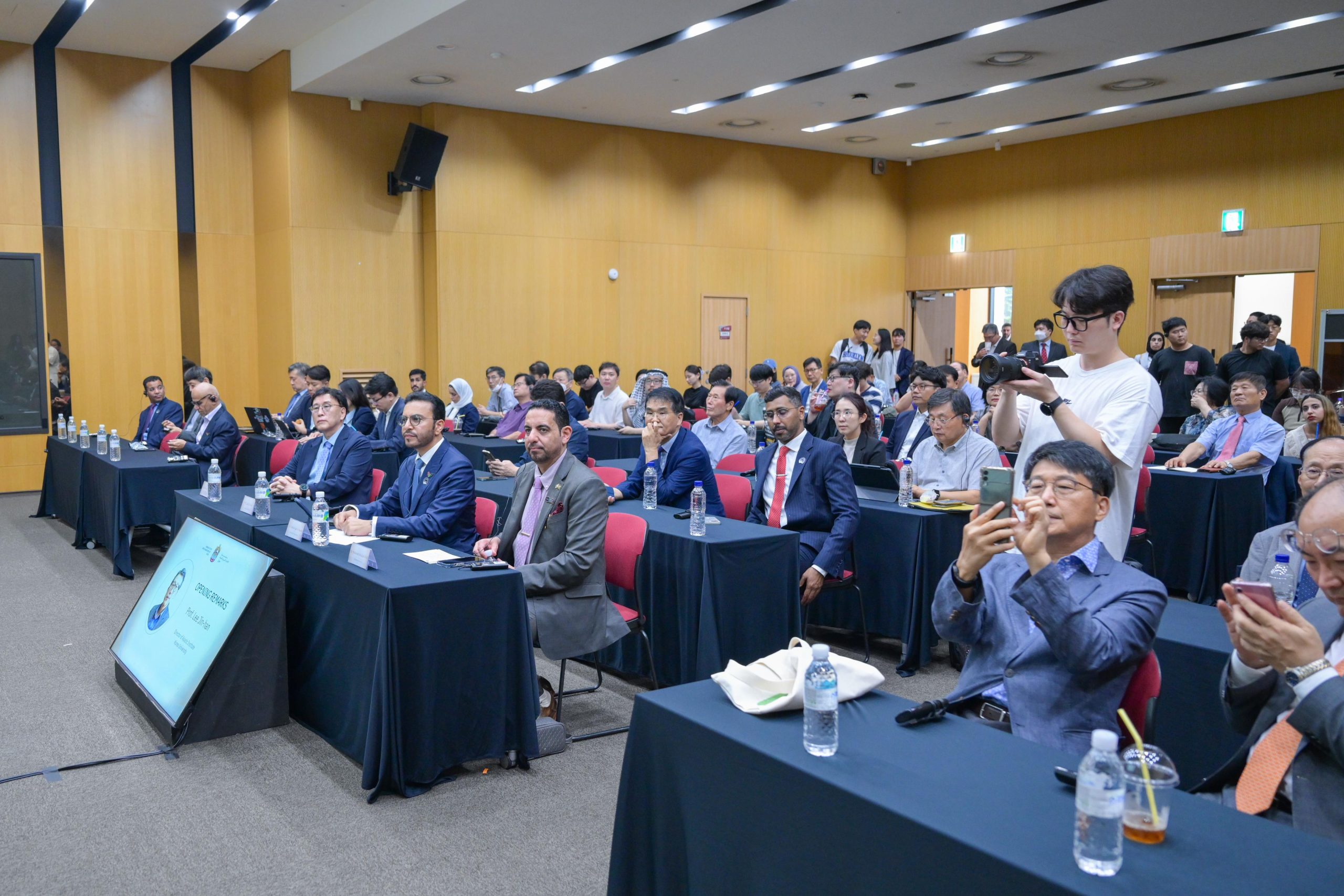The Embassy of the United Arab Emirates in Seoul, in collaboration with TRENDS Research & Advisory and the Asiatic Research Institute at Korea University, as knowledge partners, organized a symposium titled “AI for a Sustainable and Secure Future: Harnessing Artificial Intelligence for Global Stability and Ethical Innovation.” The symposium, which took place at Veritas Hall at Korea University in Seoul, was attended by H.E. Abdullah Saif Al Nuaimi, UAE Ambassador to South Korea, Dr. Mohammed Abdullah Al-Ali, CEO of TRENDS Research & Advisory, Prof. Chuck Yoo, Vice President of Korea University, and researchers, experts, and academics who explored AI’s pivotal role in shaping a sustainable and secure global future.

Importance of AI
In his welcoming speech, Ambassador Abdullah Saif Al Nuaimi emphasized that AI is not just a technological advancement but a transformative force that shapes economies, drives innovation, and influences the geopolitical landscape. He highlighted the UAE’s recognition of AI’s importance and its positive impact on enhancing service delivery. He noted that the UAE launched its AI Strategy in October 2017, paving the way for a new era of government services and infrastructure projects.

Shaping the World’s Future
Dr. Mohammed Abdullah Al-Ali emphasized the importance of AI in shaping the world’s future, affirming that TRENDS Research & Advisory places great focus on this field. He praised the UAE-Korean collaboration in science and knowledge dissemination, highlighting the role of the UAE Embassy in Korea in organizing such events.
Dr. Al-Ali presented figures demonstrating the massive global growth in AI investments, underscoring its increasing significance. He also highlighted the need to harness AI to build a safer and more sustainable future, focusing on the ethical development of these technologies while warning of the challenges posed by AI. He expressed gratitude to the Embassy for choosing TRENDS as a knowledge partner for organizing this event and to Korea University for hosting and collaborating to make this symposium successful.
Significant Cooperation
In a recorded speech, Dr. Kim Dong-one, President of Korea University, congratulated the symposium organizers and participants. He emphasized that the bilateral cooperation between the United Arab Emirates and the Republic of Korea is of great importance to both nations, noting that this cooperation has expanded from focusing on energy and construction to many other fields, including technology.
He also expressed Korea University’s readiness to enhance research and academic collaboration with TRENDS Research & Advisory in areas such as AI, international security, counterterrorism, advanced technologies, and more.

TRENDS’ Office Enhances Cooperation
In his opening remarks, Professor Jin-han Lee, Director of the Asiatic Research Institute at Korea University, stated that the inauguration of TRENDS’ Office in Korea would enhance academic and research collaboration with Korean academic groups. He expressed the University’s eagerness for further practical cooperation with the Office. He added, “We must strive to achieve mutually beneficial and meaningful results, and we will spare no effort in supporting the achievement of our shared goals.”
High-Quality Outputs
Dr. Musa Kim Jong Do, Director of the Center for Middle East and Islamic Studies at Korea University and Director of the TRENDS office in Korea, emphasized that they would achieve significant, balanced, top-tier research outcomes through research and collaboration between TRENDS and Korea University. He highlighted that the Office would focus on purposeful research, placing humanity at the center of its efforts.

Tremendous Potential
Following researcher Suaad Al-Hamadi’s presentation, experts and speakers emphasized AI’s crucial role in shaping a sustainable and secure global future. They noted that AI possesses tremendous potential to address global environmental challenges, such as climate change, resource depletion, and the development of innovative solutions for sustainability and circular economy models. AI also plays a significant role in enhancing global security.
Sustainability
The first session of the symposium, moderated by Dr. Han In-taek, a researcher at the Sejong Institute, focused on AI as a driver of sustainability. Dr. Saeed Al Dhaheri, the Center for Futures Studies Director at the University of Dubai and President of the Robotics and Automation Society, presented a paper highlighting AI’s increasing role in addressing climate change challenges and its immense potential to advance sustainability. However, Dr. Al Dhaheri warned that despite this promising potential, challenges exist, such as the significant energy consumption required to train AI models, and the ethical considerations associated with technology. He emphasized the importance of investing in research and development to create innovative solutions to these challenges and ensure the responsible use of AI.

AI and Climate
Ruqaya Al-Noamani, a Doctorate Candidate in Technology Management, Economics, and Policy Program, College of Engineering, Seoul National University, and ADNOC Scholar, UAE, highlighted AI’s pivotal role in combating climate change. She explained how AI contributes to achieving carbon neutrality by improving energy consumption, integrating renewable energy sources, and enhancing carbon capture and storage technologies. She provided real-world examples from the UAE and Korea, emphasizing the importance of deploying AI ethically to ensure its benefits are distributed fairly.
Beneficial to Civilization
Dr. Kyoung Jun Lee, a Professor of Information Systems at Kyung Hee University in South Korea, stated that advanced AI applications will contribute to sustainability across various fields. He noted that the UAE has a significant interest in and made substantial investments in AI technology, while Korea is among the top 10 countries in AI development, presenting promising opportunities for collaboration. He emphasized the importance of making AI management accessible to everyone, asserting that AI will not destroy but benefit human civilization.

AI and the Future
The second session of the symposium, moderated by researcher Zayed Al Dhaheri from TRENDS, focused on the role of AI in future security definitions. The session highlighted how AI blurs traditional boundaries and presents new challenges, emphasizing AI’s increasing impact on security concerns. As AI technology advances at an unprecedented rate, the focus shifts from regional and physical defense to digital domains.
AI and Healthcare
Dr. Joon-myoung Kwon, CEO of Medical AI Co. Ltd., provided insights into how AI redefines future security. He noted that AI’s impact extends beyond reshaping the healthcare sector to affecting broader societal frameworks. He discussed the ethical considerations of deploying AI in healthcare, focusing on balancing innovation with patient safety. Dr. Kwon presented the AI-ECG device for analyzing heart rhythms using AI, explaining its impact on the medical community and stressing the intersection of AI and health security to ensure the ethical integration of AI in healthcare to protect patient safety.
Dr. Ma Dong-hoon, a professor at the Graduate School of Media and Communication, Korea University, Seoul, pointed to a study conducted on Korean University students, which showed that ChatGPT excels in writing, organization, and storytelling. However, the study revealed limitations in the program’s ability to engage in deep discussions, produce creative work, and offer innovative solutions. The study concluded that no matter how advanced technology becomes, it cannot surpass human culture.

Future Outlook
Dr. Kim Doo-Hwan, Professor at Duksung Women’s University in Seoul, highlighted that AI constitutes a massive technological revolution with boundless potential. However, this advanced technology raises concerns about humanity’s future. He emphasized the need to leverage AI rather than fear it, arguing that AI should be seen as a powerful tool capable of building a better future for humanity. He called for developing appropriate regulatory frameworks to ensure the responsible use of this technology.
Subsequently, Mariam Al Mutawa, from the UAE Embassy in Korea, presented the symposium’s recommendations, which included the importance of investing in AI-based infrastructure, enhancing international cooperation, and establishing ethical guidelines for using these technologies.
The symposium also called for increased support for research and raising awareness about the importance of AI in addressing climate change. It encouraged widespread adoption and innovation based on AI, emphasized transparency, and stressed the need to balance the benefits of AI with its potential threats. It highlighted the necessity of proactive policies to adopt security frameworks that respond to the evolving role of AI. The recommendations pointed out that AI presents both significant challenges and opportunities. While it can contribute to solving many environmental and social issues, it must be approached with caution and accompanied by the development of suitable regulatory frameworks.



